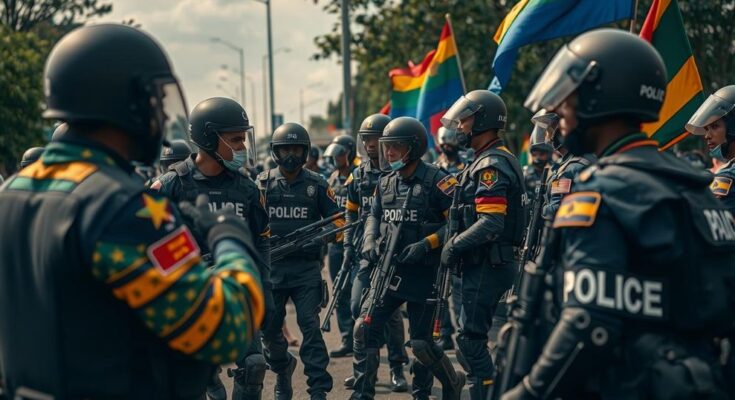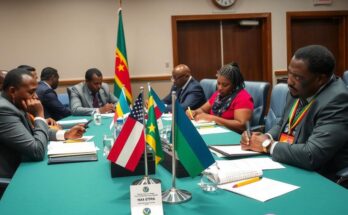In Mozambique’s capital, Maputo, police utilized tear gas against thousands of protesters disputing the electoral results of the October 9 elections. The unrest, fueled by allegations of fraud against the ruling FRELIMO party, has reportedly resulted in at least 18 deaths. The international community has expressed concern over the violence, while opposition leader Venancio Mondlane describes the period as potentially transformative for the nation.
In Maputo, Mozambique, police have employed tear gas to disperse large crowds protesting the results of the October 9 elections. Reports indicate that thousands gathered in the capital early Thursday morning, prompting the deployment of riot police. The opposition parties, notably RENAMO, have accused the ruling FRELIMO party of electoral misconduct. Human Rights Watch has reported at least 18 fatalities linked to the unrest following the elections, heightening tensions within the nation. FRELIMO’s candidate, Daniel Chapo, received 70.67% of the votes, significantly ahead of independent candidate Venancio Mondlane, who garnered 20.32%. RENAMO’s candidate, Ossufo Momade, trailed with 5.81%. Concurrently, security forces have been observed patrolling the streets, working to prevent gatherings. Tensions escalated further following the death of a police officer during the protests, which led Defense Minister Cristavao Chume to suggest military intervention might be necessary to maintain order. The United Nations High Commissioner for Human Rights, Volker Türk, expressed his concern regarding the unfolding violence, emphasizing that police should exercise restraint and adhere to international human rights obligations during protest management. Opposition leader Venancio Mondlane termed the current situation as a pivotal moment in Mozambique’s history, claiming a revolutionary sentiment is emerging among the populace despite his absence from the protests due to safety concerns. The unrest has resulted in the suspension of port and terminal operations in Mozambique, following the temporary closure of the Lebombo border crossing by South African authorities. Currently, crossings have partially resumed, allowing Mozambicans stranded in South Africa to return home.
The recent unrest in Mozambique stems from allegations of electoral fraud following the October 9 general elections, where the ruling FRELIMO party was accused of manipulating the vote. The political climate has rapidly deteriorated, leading to widespread protests organized by opposition parties. This scenario has been exacerbated by violent encounters between demonstrators and security forces, with numerous casualties reported, underscoring the fragility of Mozambique’s political landscape. The international community, particularly human rights organizations, has raised alarms about the situation, advocating for a peaceful resolution and adherence to legal standards in protest management.
In summary, the situation in Mozambique represents a significant crisis punctuated by allegations of corruption in the electoral process and subsequent civil unrest. The use of tear gas by police against protesters has ignited further concern over public safety and human rights. The urgent calls for peaceful dialogue and resolution highlight the critical crossroads at which Mozambique now stands, carrying implications for its political future and stability.
Original Source: www.dw.com




